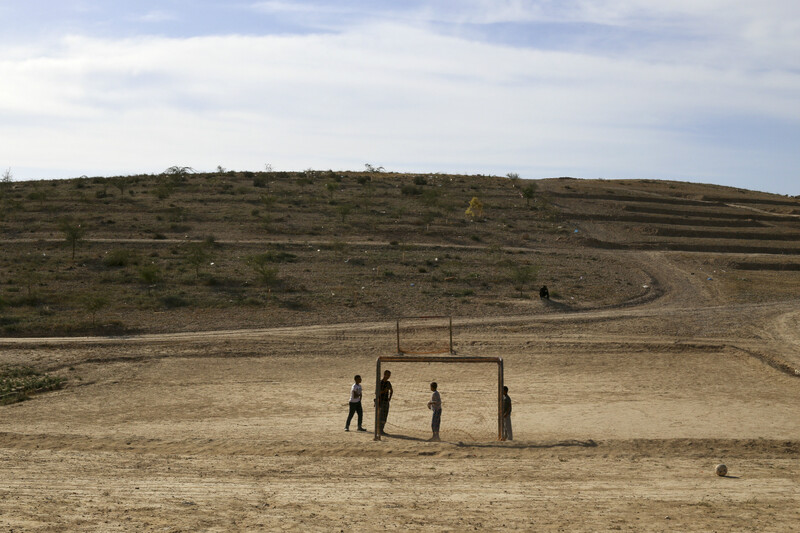Rights and Accountability 21 July 2014

Bedouin children play football in the unrecognized village of Awajan, where two children were recently injured by rocket fire from Gaza.
ActiveStillsThe Naqab (Negev) desert in the south of present-day Israel is home to 200,000 indigenous Palestinian citizens of Israel, known as Bedouins, most of whom are completely defenseless against falling rockets because the Israeli government refuses to protect their villages and denies them the right to build bomb shelters.
One of two Israeli civilians killed since Israel began its relentless bombing campaign in Gaza was 32-year-old Auda al-Wadj.
He died when a rocket fired from Gaza struck his home in Qasr al-Ser, a Bedouin village near Dimona that lacks sirens, bomb shelters and cover from Israel’s Iron Dome missile defense system because, according to Public Security Minister Yitzhak Aharonovich, the Iron Dome “does not protect agricultural areas.”
As life in Gaza grinds to a halt amid death and destruction from Israel’s merciless bombing campaign, Israeli casualties from Palestinian rockets fired in response to Israel’s military attacks and illegal policy of collective punishment and siege have been minimal.
This is due in large part, says Israel, to the Iron Dome, a US-subsidized missile defense system that Israel says intercepts rockets before they land.
Exaggerated effectiveness
As Dan Murphy reports in the Christian Science Monitor, experts believe that Israeli claims about Iron Dome’s effectiveness are grossly exaggerated.
One missile expert, Michael Armstrong of Canada’s Brock University, “concludes that fewer rockets are being fired this time from Gaza, that they’re less accurate, and being intercepted less often by Iron Dome than in 2012.”
Rockets fired by Palestinian groups lack guidance systems and can only be aimed in a general direction.
Theodore Postol, a missile expert at the Massachusetts Institute of Technology, has noted that “examination of photographs showing contrails of attempted interceptors shows few head-on hits – in his estimation just 5 percent of the time. He argues that absent such hits, the system is not performing as advertised.”
Rather, experts say, the fact that casualties as a result of rocket fire from Gaza have been minimal is more likely due to an effective early warning system and the availability of bomb shelters.
But Israel’s government says — and most Israelis apparently believe — that the Iron Dome is effective. And Israel also denies Bedouins the right to build bomb shelters; the Israeli army defines their homes as “open areas” unworthy of Iron Dome protection.
Combined with Israel’s vast network of bomb shelters and the sheer lack of firepower in the Palestinian arsenal, the Iron Dome has helped shield Israelis — psychologically at least — from the consequences of ghettoizing and imprisoning 1.8 million Palestinians in Gaza.
But not all Israeli lives are worthy of this protection.
“Open areas”
Israel’s high court on Sunday rejected a petition filed by the Association for Civil Rights in Israel (ACRI) on behalf the Negev Bedouin community requesting equal protection from falling rockets.
In addition to Auda al-Wadj’s death, four of his family members were injured in the strike, including his four-year-old son and three-month-old daughter.
When rockets from Gaza land in Israel, they are often reported to have struck “open areas” or “agricultural areas” which, as noted, just so happen to be the same labels the Israeli army applies to Bedouin villages to avoid intercepting rockets headed for their communities.
As Yasser al-Beit, a relative of al-Wadj, told The Times of Israel, “When you hear of impacts in open areas, sometimes it’s fallen [near] one of our homes.”
After al-Wadj’s death on Saturday, ACRI filed an urgent request for a decision from the high court, arguing that “further fatalities … could be avoided if the residents had access to a secure space that could provide them with a minimal level of protection from shooting.”
The high court sided with the state, asserting that it is the responsibility of Bedouin residents to provide their own protective facilities — which completely ignores the fact that most Bedouin villages are “unrecognized” by the Israeli government and are therefore forbidden from building new structures, all of which are subject to demolition orders, including bomb shelters. As for the Bedouin homes that do exist, they are mostly shacks that provide little to no safety.
“Lie on the ground”
As an alternative, the court advised Bedouins to “lie on the ground” for protection from rocket fire.
“State officials completely disregarded the fact that in villages where there are no shelters, no sirens, and where the houses are built mostly of aluminium — a falling rocket is exponentially more dangerous,” said ACRI attorney Auni Banna. “The state’s conduct conveys a sense of how they distinguish one type of blood from another, and the abandonment of the Bedouin in the unrecognized villages.”
Despite being citizens of Israel whose presence in the area pre-dates the massive ethnic cleansing in 1948 that brought Israel into being, the Bedouin are labeled by the Israeli government as “illegal trespassers” who are squatting on state land simply because they are not Jewish.
As a result, some 80,000 Bedouins living in so-called unrecognized villages are prevented by the government from connecting to the state electricity grid and water networks, are denied basic services like garbage collection and sewage treatment and are prohibited from building homes, clinics and schools — conditions that have transformed many Bedouin communities into impoverished slums.
In 2013, the Israeli government’s Prawer-Begin Plan sought to forcibly expel 40,000 Bedouins from their ancestral lands, with plans to “concentrate” them into American Indian-style reservations that would serve as cheap labor pools for the Jewish-only towns meant to replace the Bedouin villages.
The plan was temporarily halted following international protests. But discrimination and home demolitions continue unabated.
Iron Dome for Jews only
On 14 July, two Bedouin sisters, Maram al-Wakili, 11, and Atil al-Wakili, 13, were seriously injured by a rocket that hit near their home in Awajan, a Bedouin village under threat of displacement by the Jewish National Fund (JNF). The JNF began planting trees (a precursor to ethnic cleansing) around the village in May.
The girls’ uncle, Omar al-Wakili, was among those who petitioned the high court for protective measures for the Bedouin community.
The Israeli army told Haaretz that the girls’ home is in an “open area” that does not qualify for Iron Dome protection, adding that “The Iron Dome missile defense system is deployed firstly to defend facilities defined as ‘strategic’ (such as Air Force bases and energy plants) and then according to population density. ‘Small and isolated settlements’ are given lower priority when deciding on deployments.”
Gadi Algazi of the Tarabut-Hitchabrut Arab-Jewish movement disagreed, telling Haaretz, “There are 200,000 Bedouin in the Negev, 70,000 or 80,000 of whom” live in what are described as ‘unrecognized villages’” which are “three times that of the average Jewish settlement in the Beer Sheva area.”
Made possible by the US
The United States has financed the Iron Dome to the tune of $720 million since 2011. And just last week, a US Senate appropriations subcommittee unanimously voted to double US funding for the Iron Dome system for 2015.
On top of bankrolling Israeli aggression against Palestinians, US taxpayers are also subsidizing a costly missile defense system that facilitates Israeli apartheid inside the green line (the boundary between present-day Israel and the West Bank), where the circumstances of one’s birth determine how worthy one is of potentially life-saving protection from retaliatory rockets.





